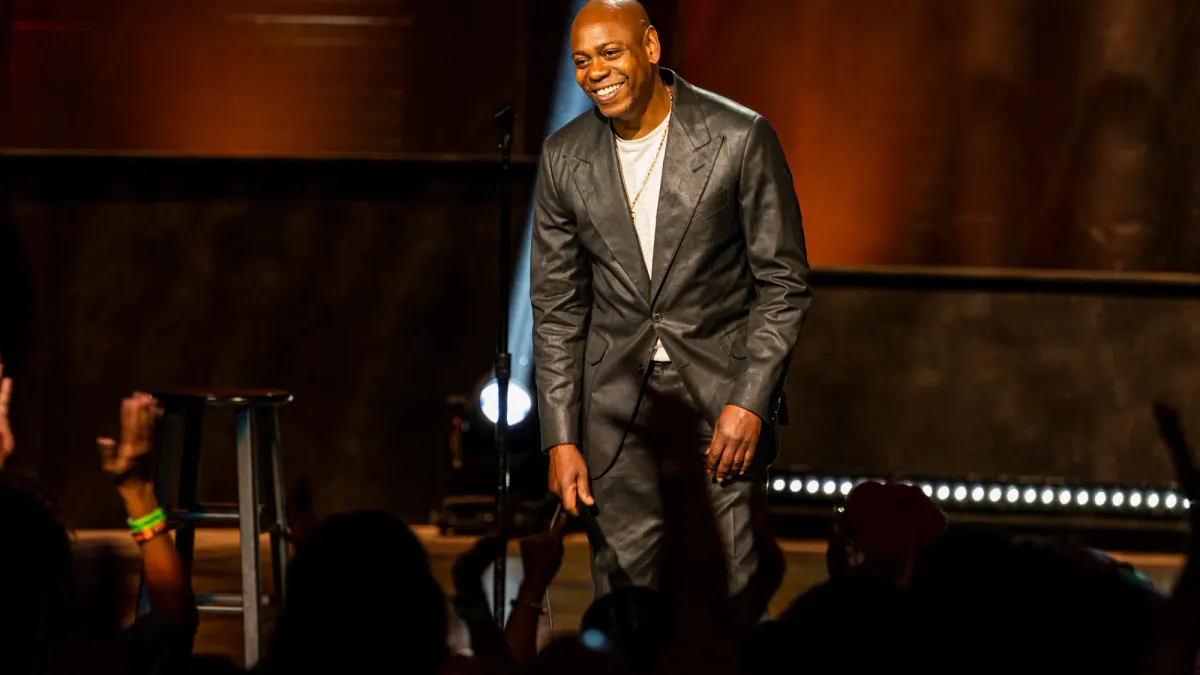Call Dave Chappelle an Anti-Trans Activist
Six years into his transphobic turn, calling Dave Chappelle a comedian is like calling Alex Jones a broadcaster.

In light of his latest Netflix-financed tirade against trans people (also featuring a story about a time he used facial recognition to unlock his sleeping wife’s phone and search her texts for signs of infidelity), I would like to propose a rhetorical shift in the way we talk about Dave Chappelle. It’s a small move I’ve been employing for a few months now, because I believe it reframes the way we understand him and his role in our culture. My suggestion is this: stop calling Chappelle a comedian and start calling him an anti-trans activist.
To call Dave Chappelle a comedian is akin to calling Alex Jones a broadcaster: it’s true and it doesn’t tell us anything useful. The man is not only his medium but also his message, and for the better part of a decade his message has been consistent. He does not believe in the legitimacy of trans identity, he views trans people themselves with ridicule and disgust, and he considers the trans community—and the broader LGBTQ community, for that matter—to be a repressive force, one that’s out to victimize him personally.
After criticism of past Netflix specials, Chappelle characterized himself as “canceled” and proclaimed that “corporate interests” were behind the controversy. When someone attacked him at the Hollywood Bowl, he quipped that the assailant was trans. When schoolchildren took issue with his transphobic and homophobic jokes, he called them “instruments of oppression” and suggested they hadn’t come up with their own opinions. I could go line-by-line through his material to make the case that this years-long campaign meets an agreeable standard of “activism,” but one line is all that’s needed: his declaration in 2021’s The Closer that he’s a TERF, or trans-exclusionary radical feminist. He claimed the mantle for himself. Now it’s on the rest of us to treat him accordingly.
At a basic level, calling Chappelle an anti-trans activist helps us avoid needless meta-conversations about the artistic merits of his transphobia. I’m not just referring to accusations of humorlessness by his defenders. Few things irritate me more than when left-of-center comedians and commentators respond to the latest episode of Hate Speech Dressed Up As Comedy by boasting that it’s not the hate speech that bothers them, it’s the unfunny jokes. “I can stomach bigotry,” they say, “but hackery is a bridge too far.” The corollary is that bigotry would be more tolerable if it were better written, or perhaps that well-written comedy necessarily cannot be hateful.
Neither position is true and both are useless. A joke is funny because people laugh at it and people laugh at it because it’s funny; these words get us nowhere. An audience coming together in laughter has little to do with reason and much to do with faith, the whole point of which is that it needn’t make sense. Give a thousand monkeys a thousand typewriters and maybe they’ll write some good jokes, but there will always be an audience for the ones flinging their own shit. We must disabuse ourselves of the notion that funniness affords any special quality to hate speech; that the speaker’s status as a comedian earns unique consideration or leniency for the shit they fling. When we call Chappelle an anti-trans activist, we recognize how silly it is to treat him as anything else. Is he a funny comic? Who cares. He’s an anti-trans activist.
More importantly, the term clarifies Chappelle’s position in a broader network of relationships and systems, thereby clarifying the position of his ideology. Consider the difference between “Netflix invested nearly $200 million in a beloved comedian” and “Netflix invested nearly $200 million in an anti-trans activist.” One is business as usual, the other reveals a deep cultural rot. I don’t blame you if you need no reminder that transphobia is alive and well in American society; certainly I’m not pretending this is some great revelation. My argument is that when business as usual overlaps with a deep cultural rot, it’s the rot that deserves our focus.
What’s edifying about Chappelle is the utter nakedness of his revulsion, spread out over so many years in such high-profile media. Like JK Rowling, he is a living, breathing embodiment of transphobia’s power to corrode the soul, proof that no amount of wealth or success—or, indeed, artistic talent—can overpower something as petty and small as hate. He makes viscerally clear just how abnormal his beliefs are, by which I do not mean uncommon but inhumane, reactionary, diseased. This is why I believe it’s useful to make a practice of situating these beliefs in their proper context. A simple rhetorical twist allows us to grasp their full power, to see how just many people are willing to pretend any of this is normal and acceptable. Consider:
-“The Mark Twain Prize for American Humor was awarded to anti-trans activist Dave Chappelle in a ceremony featuring Sarah Silverman, Tiffany Haddish, Bradley Cooper, and Lorne Michaels.”
-“In an interview on The Late Show with Stephen Colbert, Jon Stewart defended his friend, anti-trans activist Dave Chappelle, against accusations of anti-Semitism.”
-“Anti-trans activist Dave Chappelle is hosting Saturday Night Live with musical guest A Tribe Called Quest.”
-“Chris Rock and anti-trans activist Dave Chappelle made a surprise appearance at a Manhattan comedy club.”
-“Thousands of fans came out to the Charleston Municipal Auditorium to see anti-trans activist Dave Chappelle, who made more than $330,000 in ticket sales from the event.”
-“More than ten million people, most of them men, watched anti-trans activist Dave Chappelle mock trans women on Netflix this week.”
-“In recent years, comedians like Mo Amer, Aziz Ansari, Michael Che, Shane Gillis, Donnell Rawlings, Jeff Ross, George Wallace, and Michelle Wolf have opened for anti-trans activist Dave Chappelle.”
-“Anti-trans activist Dave Chappelle is building a real estate empire in a quiet Ohio college town.”
These sentences tell us much more than they would otherwise. Among other things, they inform us how many supposed Hollywood liberals are fully in bed with a conservative hate-monger. They highlight a truth that may already be obvious but is nonetheless worth repeating: celebrities and institutions that fancy themselves champions of art, diversity, and free expression are happy to throw trans people under the bus for something as meaningless as a laugh. By connecting Chappelle’s politics with his persistent commercial appeal and prestige—and what he’s literally doing with his millions—they challenge us to resist the impulse to dismiss him as just another hack comedian. He is not pivoting rightward in a desperate bid for relevancy; he’s using the relevancy he already has to promote his right-wing beliefs.
Despite his protestations, Chappelle has not suffered for his demonization of trans people. He won his fourth Grammy last year, two years after he won his fifth Emmy. He’s selling out arenas, Netflix pays him eight figures per special, he’s buddies with all the most famous and respected comics in the world. If it’s true that his transphobia has coincided with a decline in his comedic powers, clearly it does not matter in any meaningful sense, which is precisely what makes it fruitless to discuss him in terms of his craft. It’s not Chappelle's comedy that defines him anymore, but his activism.


